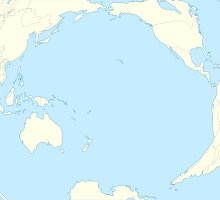Canada–Philippines waste dispute
 From Wikipedia - Reading time: 9 min
From Wikipedia - Reading time: 9 min
The Canada–Philippines waste dispute was an international row over mislabeled Canadian garbage shipped to Manila by a recycling company. The 103 shipping containers that left from Vancouver in 2013–14 were labeled as recyclable plastics; they instead contained household waste.
The intricacies of international treaties, the private company involved, and Canadian regulations complicated the situation through 2019 when Philippine President Rodrigo Duterte began threatening Canada with ultimata. On May 30, 2019, 69 containers of Canadian trash were shipped back.
Garbage
[edit]In 2013 and 2014, 103 shipping containers were transported from Vancouver to Manila[1] by Chronic Plastics Inc.[2] Though declared to contain recyclable plastic, the Bureau of Customs found instead "household trash, plastic bottles and bags, newspapers, and used adult diapers".[3]
Chronic Plastics has been accused of violating the Basel Convention (on the Control of Transboundary Movements of Hazardous Wastes and Their Disposal); the Philippines and Canada are both signatories. While the treaty stipulates that "the exporting country must take back the waste materials if the receiving country refuses to accept them", Canada refused on the grounds that the garbage was municipal solid waste, not hazardous waste.[4] The Philippine Department of Environment and Natural Resources' Hazardous Waste Management Section Chief, Geri Geronimo Sañez, confirmed this saying, "It's a blue bin waste. [sic] That's paper, dry plastic generated from the kitchen. I have not seen any syringe, any diaper. It's not hazardous, but it's waste still". By November 2017, at least 26 of the containers' trash had been buried at a landfill in Capas, Tarlac.[5]
Repatriation
[edit]In 2016, a Philippine court ruled that the garbage should return to Canada.[3] That same year, Canadian environmental laws were changed to require companies such as Chronic Plastics to retrieve their trash.[6] At the 2017 summit for the Association of Southeast Asian Nations, Canadian Prime Minister Justin Trudeau explained that Canadian laws and regulations had prohibited his nation from accepting the garbage, but that workarounds were in place, though the two nations had not yet settled on financial responsibilities.[5] As of November 13, 2018[update], storing the Canadian waste had cost approximately 36 million Philippine pesos (683,612 United States dollars).[4]
In an analysis of the situation in January 2019, Antonio La Viña said that there was nothing for the Philippines to do but wait on Canadian retrieval of the trash.[4] About three months later, in the wake of the 2019 Luzon earthquake, Philippine President Rodrigo Duterte lashed out at Canada over the garbage remaining in Manila. After accusing Canada of denigrating Filipinos, Duterte proclaimed that if the trash was not removed by Canada within a week (by April 30, 2019), the Philippines would declare war on Canada.[2] In response to Duterte's threat, the Canadian ambassador to the Philippines said, "I won't comment on the specific words of the president or his tone, but I will say this: Our prime minister committed and has recommitted to resolving this issue, including taking the waste back to Canada."[3]
A week after his deadline was missed, Duterte set a new one of May 15, with his secretary of foreign affairs—Teodoro Locsin Jr.—saying,[6] "The President expects the garbage to be seaborne by May 15. That expectation will be met or else…"[7] That same day, Global Affairs Canada announced that they had made an offer to retrieve the garbage and were working closely with the government of the Philippines to work out the details.[8] Bolloré Logistics Canada was awarded the Canadian government's contract to ship the waste out of the Philippines.[9]
At the Subic Special Economic and Freeport Zone[10] on May 30, 2019, 69 shipping containers of Canadian trash were loaded onto the cargo ship M/V Bavaria for transport to Canada[9][11] at a cost of US$840,000 (equivalent to about $1,033,000 in 2024).[12] After being transferred to the Anna Maersk while in Taiwan, the trash was still on schedule[9] to reach Canada by the end of June 2019, after which—according to Environment and Climate Change Canada—it would end up at a Vancouver waste-to-energy plant.[12]
On June 4, with the refuse matter considered settled, Philippine Executive Secretary Salvador Medialdea lifted Duterte's five-day bans on traveling to Canada and doing business with Canadian officials. By June 6 though, the Philippine ambassador to Canada had not yet returned.[13] Finally, on June 29, 2019, 69 containers of Chronic Plastics' wayward trash[14] arrived at the Roberts Bank Superport in Delta, British Columbia.[15]
References
[edit]- ^ Shore, Randy (April 24, 2019). "Philippines fiasco: Doctored paperwork obscures origin of garbage shipped to Manila". Vancouver Sun. ISSN 0832-1299. Archived from the original on April 26, 2019. Retrieved April 29, 2019.
Other than being shipped from Vancouver, little is known about where the material really came from.
- ^ a b Merez, Arianne (April 23, 2019). "Duterte threatens 'war' vs Canada over trash shipment". Manila: ABS-CBN Corporation. Archived from the original on April 23, 2019. Retrieved April 24, 2019.
- ^ a b c Chappell, Bill (April 24, 2019). "Philippines' Duterte Talks Trash (Literally) To Canada, Threatening War Over Garbage". NPR. Archived from the original on April 24, 2019. Retrieved April 24, 2019.
- ^ a b c Quintos, Patrick (January 16, 2019). "Why Canada garbage still in PH after 5 years while Korean trash is going back". Manila: ABS-CBN Corporation. Archived from the original on March 30, 2019. Retrieved April 24, 2019.
'Canada refused to take responsibility over trash'
- ^ a b Domingo, Katrina (November 14, 2017). "Trudeau: Canada working to resolve 'irritant' trash issue with PH". Manila: ABS-CBN Corporation. Archived from the original on January 22, 2019. Retrieved April 24, 2019.
- ^ a b Gutierrez, Jason (May 8, 2019). "Philippines Sets Deadline for Canada to Take Back Trash". The New York Times. Manila. ISSN 1553-8095. OCLC 1645522. Archived from the original on May 11, 2019. Retrieved May 14, 2019.
- ^ Locsin Jr., Teodoro [@teddyboylocsin] (May 7, 2019). "The President expects the garbage to be seaborne by May 15. That expectation will be met or else…" (Tweet). Archived from the original on May 13, 2019. Retrieved May 14, 2019 – via Twitter.
- ^ Choi, Tyler (May 7, 2019). Ljunggren, David (ed.). "Canada will accept garbage containers wrongly sent to Philippines, says Manila". Toronto. Reuters. Archived from the original on May 9, 2019. Retrieved May 14, 2019.
- ^ a b c Smith, Marie-Danielle (June 18, 2019). "Garbage from Philippines on its way to Canada aboard a different ship, government says". National Post. Ottawa. ISSN 1486-8008. Archived from the original on November 14, 2023.
After a series of stops along the shipping route, the ship docked in Taiwan where the containers full of garbage were offloaded and transferred to a larger ship
- ^ Lopez, Ron (June 1, 2019). "Philippines ships dumped trash back to Canada". The Jakarta Post. Southeast Asia. Agence France-Presse. ISSN 0215-3432. Archived from the original on June 17, 2019. Retrieved June 18, 2019.
- ^ Cabana, Ysh (June 28, 2019). "Garbage shipped back to Canada". The Philippine Reporter. Archived from the original on June 13, 2020. Retrieved June 13, 2020.
- ^ a b Kennedy, Merrit (May 31, 2019). "'Sordid Chapter' Ends As Philippines Sends Back Canada's Trash". NPR. Archived from the original on June 16, 2019. Retrieved June 18, 2019.
- ^ "Philippines normalizing Canada relations after garbage dispute". Ottawa: Global News. The Canadian Press. June 6, 2019. Archived from the original on July 20, 2019. Retrieved July 26, 2019.
- ^ "Canada takes garbage back from Philippines, ending long dispute". Vancouver: CNA. June 29, 2019. Archived from the original on July 26, 2019. Retrieved July 27, 2019.
- ^ "Canada waste returns home after Philippines' war threat". Deutsche Welle. June 29, 2019. Archived from the original on July 26, 2019. Retrieved July 27, 2019.
More than 60 containers full of garbage have returned to the western shores of Canada after being stranded for years in the Philippines. The matter had sparked a diplomatic row and prompted threats of an armed conflict.
 KSF
KSF

